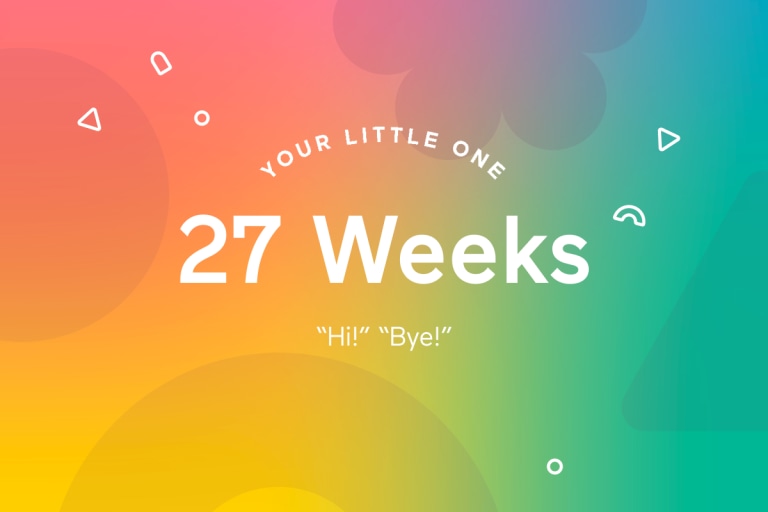
Your 27-Week-Old Baby
Fun activities for your social butterfly, plus doing the wave and dreaming big

By Babylist Staff
In This Article
Milestone: Waving
Does it get any cuter than a happy baby waving? Although you may still be a couple of months away from this milestone, some babies wave as early as seven months. This sweet gesture is another great way of communicating before they can actually say hi and bye (plus, it always brightens the day of strangers who get a friendly wave in passing!).
Tip: Babies pick up this skill by mimicking you, so be sure to wave hello and goodbye often.
Babies and REM sleep
Ever noticed your baby’s eyes fluttering around under their eyelids as they sleep? That’s a telltale sign that they’re in REM (rapid eye movement) sleep. This is a lighter part of the sleep cycle where babies are busy dreaming. According to the Children’s Hospital of Philadelphia, babies spend half of their sleep time in REM sleep, while older kids and adults sleep fewer hours, with less time in REM sleep. Why do babies need so much REM sleep? A 2015 study found that it supports brain development and helps babies convert their waking experiences (Blocks! Puppies! Mushy orange stuff on a spoon!) into lasting memories and lifelong skills.
Baby Classes and Playgroups
You'll start to notice you have a social butterfly on your hands (er, hip). In addition to waving, your baby may be flashing that sweet, gummy smile all over town. Give those budding social skills a chance to grow even more by signing your baby up for a class. Taking a class with your baby helps you spend quality time together, fosters connections with other kiddos and boosts brain development. And don’t be fooled by a “mommy & me” name—classes are designed for any parent, grandparent or caregiver to attend.
At this age, music classes are always a great choice. Babies love the tunes and stay engaged by playing with toy instruments and crawling around the room (so you’ll definitely be on your toes!). Think your baby is only interested in chewing on the maracas? Think again. These classes pave the way for a lifelong love of music and give your kiddo an exciting environment to explore. So all that drum banging is actually serving a purpose. (PS: you’ll end up with a bunch of new songs to sing at bedtime!) Music classes are offered on weekdays and weekends, so you can almost always find one that works with your family’s schedule.
Another fun, but low-key social gathering for little ones? Storytime at the library. Many public libraries have free storytimes for young babies and toddlers. They cater to short attention spans (they're usually 15-30 minutes) and are a fun way to introduce your little one to the library, books and reading.
A more informal way to make new friends is by joining (or creating!) a neighborhood playgroup. Whether it’s a weekly get-together at the park, someone’s house or at a community center, these hangout sessions are fun for both grown-ups and babies. Playgroups give parents and caregivers a chance to meet others with kids of a similar age (that means you’ll be in good company for commiserating about teething and sleepless nights). Plus, it’s a regularly scheduled reason to get out of the house, which we know can sometimes still be hard to do on your own! Better yet, it helps babies get more comfortable in new places and with new people.
Teaching Babies to Swim
And speaking of getting out of the house...grab your swimsuits, pack the swim diapers and head to the local pool! Even babies can learn a lot from a swimming class. While they won’t be doing a backstroke anytime soon, infant swimming classes help tots get comfortable in the water early on.
You or another caregiver will need to get in the water with them. You'll be responsible for holding your baby, but a teacher will guide you both through floating, kicking and bubble blowing. There may even be songs to sing and rubber duckies to grab.
A few tips:
Make sure baby isn't hungry, but hasn't just eaten before getting into the pool. Try to leave at least 30 minutes between feeding and swim time.
Schedule the lesson for after naptime, so baby won't be tired or cranky for the lesson.
Get baby used to the water during bath time. Have them lay down in the water or gently pour water over their head to get them acclimated.
Check out local swim schools or community centers for infant swimming classes in your area.